Photo: Michael Buckner/WireImage
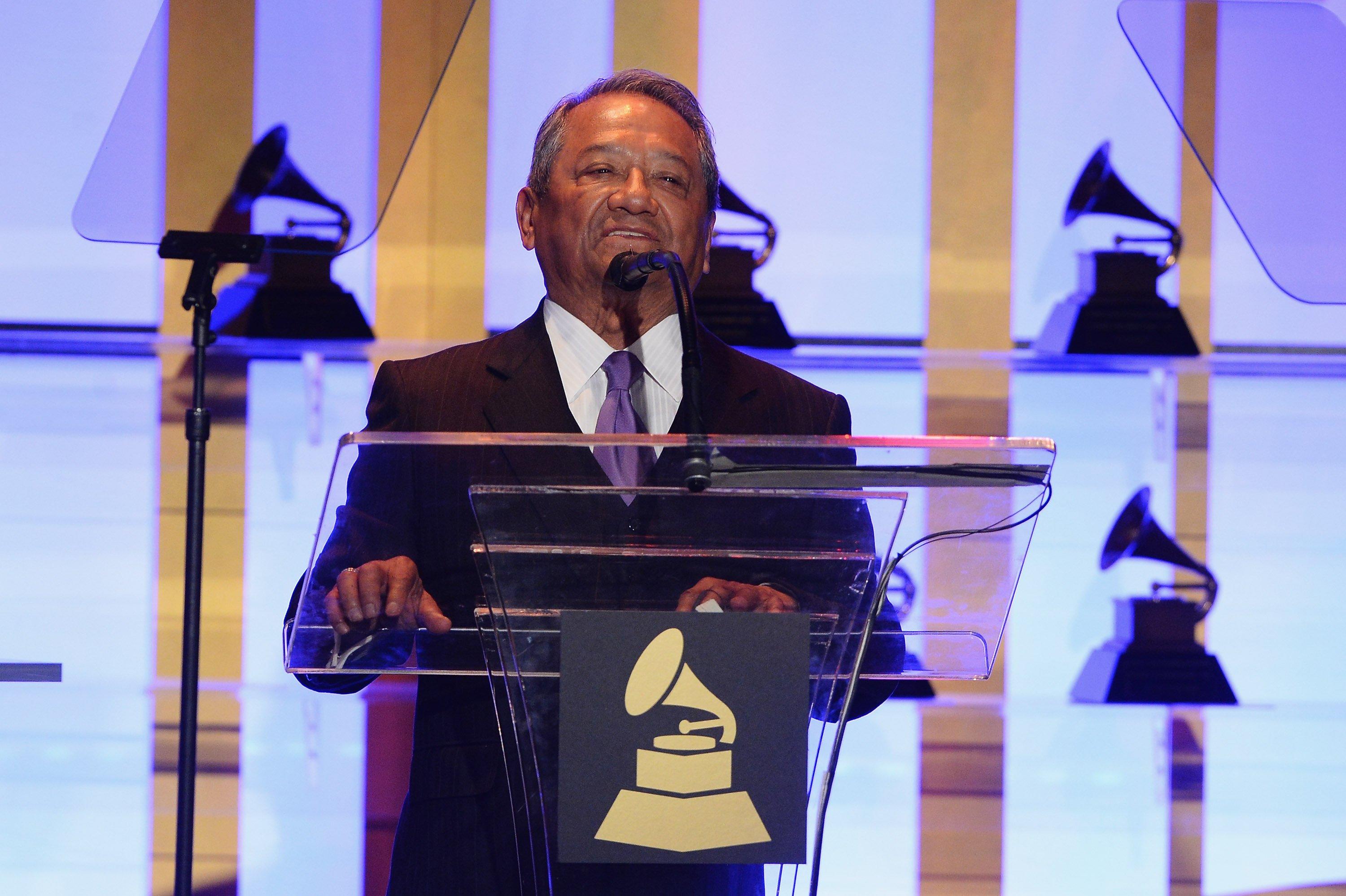
Armando Manzanero accepts the Lifetime Achievement Award in 2014
news
Remembering Armando Manzanero, GRAMMY-Nominated Singer And Composer And Lifetime Achievement Award Recipient
Manzanero, who made history as the first-ever Mexican to receive the Recording Academy's Lifetime Achievement Award, was one of the most successful and prolific composers of Latin America
The Latin music world is in mourning today with the passing of legendary Mexican composer and singer Armando Manzanero, who died Monday (Dec. 28) after a weeks-long battle with COVID-19, CNN reports. He was 85.
The Recording Academy and the Latin Recording Academy have released a joint statement on Manzanero's passing.
"One of the world's most prominent and acclaimed Latin music composers, Armando Manzanero needs no introduction. He began his career at the age of 15 with the first of what would be more than 400 original works composed over a span of more than seven decades. Transcending languages, genres and generations, Manzanero's songs have been performed by many artists, from Perry Como, Elis Regina and Elvis Presley to Tania Libertad, Gal Costa and Eugenia León.
"Manzanero was a Latin GRAMMY winner and the recipient of Lifetime Achievement Awards from both The Latin Recording Academy and the Recording Academy. Most importantly, he was a great friend and supporter of the Latin Academy. He will be greatly missed, but his melodies and larger-than-life personality will live on forever.
"His passing is a great loss for the world of music. Our hearts go out to the Manzanero family, to the Mexican Society of Songwriters, to his fans and to all of Mexico during this difficult
| Harvey Mason jr. Chair & Interim President/CEO Recording Academy |
Gabriel Abaroa Jr. |
Born in Mexico in 1935, Manzanero was one of the most successful and prolific composers of Latin America. As CNN reports, he counted more than 600 songs to his name, according to Mexico's Society For Authors And Composers, where he served as president.
A celebrated artist and songwriter, Manzanero earned several top honors across the American and Latin music industries. At the 14th GRAMMY Awards, held in 1972, he earned his first and only GRAMMY nomination for Song Of The Year for "It's Impossible," performed by Perry Como; the song was the English version of Manzanero's song, "Somos Novios."
<style>.embed-container { position: relative; padding-bottom: 56.25%; height: 0; overflow: hidden; max-width: 100%; } .embed-container iframe, .embed-container object, .embed-container embed { position: absolute; top: 0; left: 0; width: 100%; height: 100%; }</style><div class='embed-container'><iframe src='https://www.youtube.com/embed//_YJg0SpOoeQ' frameborder='0' allowfullscreen></iframe></div>
In 2014, Manzanero made history when he became the first Mexican to receive the Lifetime Achievement Award, one of the Recording Academy's highest honors, according to CNN.
"Talking about him and his songs is like talking with family at our kitchen tables," Mexican singer and Emmy-winning actress Lucero wrote about Manzanero for his Lifetime Achievement Award honor. "He has taken over our hearts with such ease. He has entered our lives to fill them with wonderful sounds, accompanied by his piano, his voice and the vast amount of talented singers who have interpreted his songs with pride for decades. We've heard his songs in many languages and many countries, delivering the flavor of his native Yucatán to unexpected places. He makes me proud to be Mexican like him."
In 2001, Manzanero won a Latin GRAMMY for Pop Duo/Group w/Vocal for his 2001 duets album, Duetos ("Duets"). In 2010, he received the Latin Recording Academy's Lifetime Achievement Award.
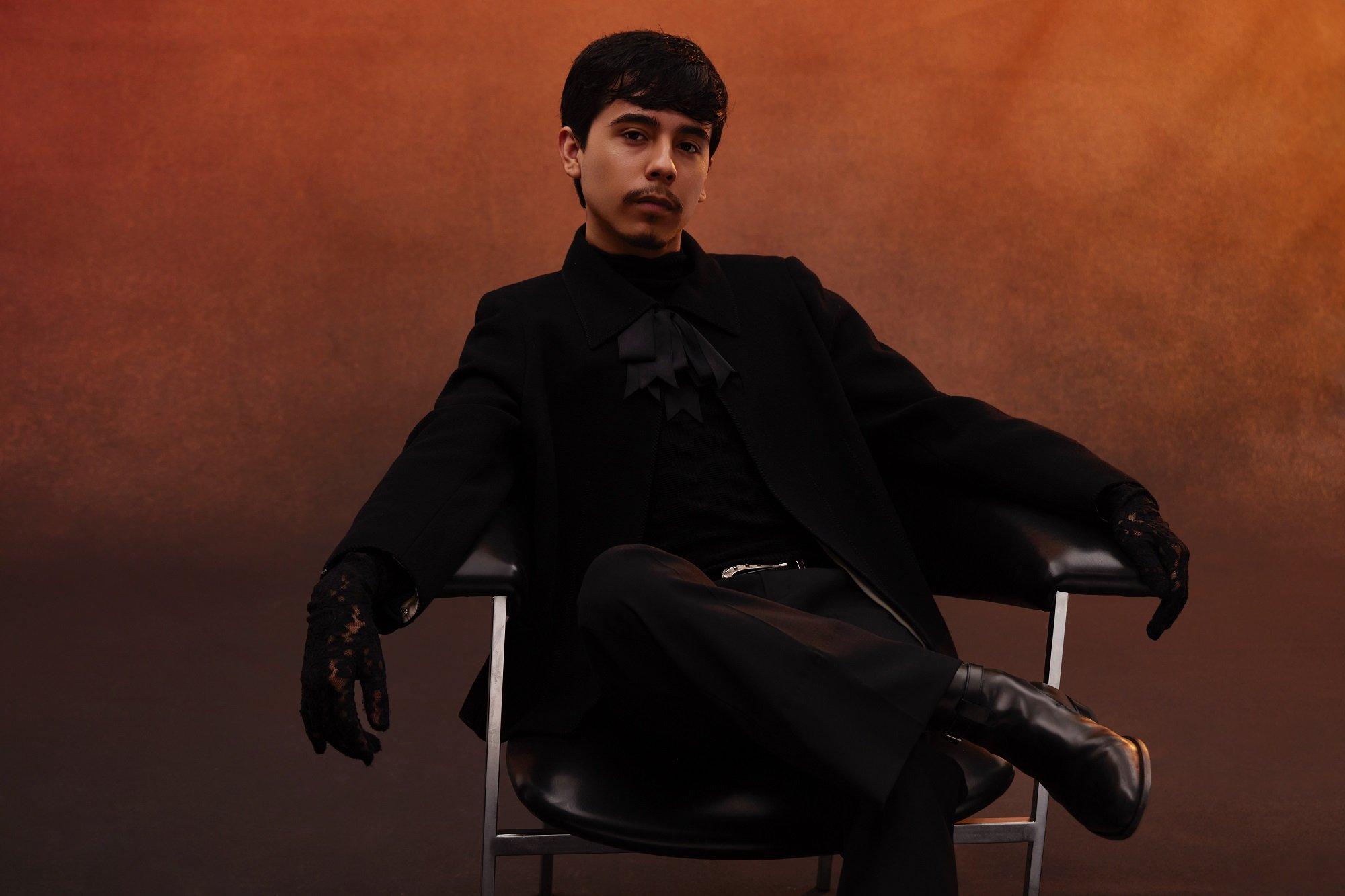
Photo: Le3ay Studio
interview
On 'Mirada,' Ivan Cornejo Redefines The Sound Of Sad Sierreño And Helps Fans Heal Through Music
Ivan Cornejo has always found solace in music. With his new LP, 'Mirada,' he wants his fans to experience that sense of belonging: "I write about emotions that everyone goes through or has been through."
Within the landscape of Música Mexicana, Ivan Cornejo is a rarity.
The 20-year-old California native stands out as one of the most intriguing acts in a genre represented by artists known for their flashy looks and music. Soft-spoken and warm, Cornejo's gentle demeanor effortlessly translates into his music and on-stage persona and musical productions.
Cornejo's songs and lyrics are far removed from the "corridos tumbados" that have taken over global charts. Fans have dubbed the Mexican American singer the "Gen Z therapist" because of his heartbreak-influenced lyrics and dexterity in creating the ethereal, melancholic sound known as sad sierreño.
With two albums under his belt, Cornejo makes his major label debut with Mirada, released on July 18 via Zaragoza Records / Interscope. The album features the wistful, sad sierreño sound that made Cornejo famous three years ago with "Está Dañada," a heart-wrenching ballad from his first LP, Alma Vacía (2021).
In the single, which has amassed over 270 million streams on Spotify, Ivan — then 17 — captivated listeners with powerful melodies accompanied by languid and nostalgic vocals, reciting verses filled with maturity beyond his years.
In Mirada, the Música Mexicana breakout star presents 12 solo songs inspired by summer nights, including singles "Aquí te Espero," "Donde Estás," "Baby Please," and "Intercambio Injusto." As with his previous productions, Cornejo makes heartbreak the central theme of his album while guitars and melodies reminiscent of alternative rock take center stage.
While the album doesn’t feature additional artists, Cornejo opened up to collaboration within the studio. The singer, used to collaborating solely with his producer, Frank Rio, encountered a challenge when bringing two additional creatives into the studio.
"The process for this new project was very different," Cornejo tells GRAMMY.com in a Zoom interview from Mexico City. "[Having other] creatives in the studio [resulted] a lot of learning. For example, my producer and I learned a lot from each other; we had constructive disagreements. We heard each other's opinions and learned a lot from this project."
The rising sad sierreño star discusses with GRAMMY.com the creative challenge of Mirada, the artistic boundaries he pushed along the way, the advantage behind bilingual songwriting, and the unexpected singer that influenced his lyrics.
This interview has been edited for length and clarity.
'Mirada' feels very personal, almost like a diary. How would you describe the album's overall theme and feeling?
While writing and recording this album, I wanted it to feel very personal, intimate, and gentle but with a little more uplifting sound.
I wanted the Mirada theme to feel like a nostalgic summer night. I want people to feel like they can play these songs on the beach, with friends, or alone in bed. I wanted it to feel a little euphoric.
The record showcases a blend of Latin and Anglo influences. Tracks like "Baby Please," "Dónde Estás," and "Aquí te espero" have a rock ballad feel. What inspired this fusion?
My influences come through a lot. I remember listening to my sister's and brother's music at eight while my parents would play classical regional Mexican music, like mariachi and corridos. As I grew up and started making music, it meshed into this sad sierreño and this funky Spanish alternative [genre].
The guitar is a staple in your sound. How did it become so central to your musical expression?
I started playing the guitar when I was about seven. I fell completely in love with the instrument. My mom tried to put me in violin classes, and I learned the instrument for a while, but the guitar kept winning me over. I kept learning more and more about the guitar, and around 12, I started learning songs by Radiohead, Arctic Monkeys and Tame Impala, and that's where my music emerged.
Mirada portrays the nostalgia around summer nights. How were those nights for you?
I spent it with my friends, making a bonfire and hanging out at the beach, pool, or jacuzzi.
Those nights when you just put your phone away and let the wind hit you and talk about your feelings, your thoughts are different, that kind of night.
What kind of music did you listen to on those summer nights?
Last summer, I listened to [Bad Bunny’s] Un Verano Sin Ti; [that album] was No. 1 on my playlist.
The year before, I listened to just any vibey music, like Arctic Monkeys, Tame Impala, or Radiohead, when I was alone. Cigarettes After Sex, I listened to them a lot during the summer when I was going to sleep. I always put them on.
You say that each track on this album is pushing the boundaries of your art. In what aspect are you breaking those barriers?
I go back to my last two albums [Alma Vacía and 2022’s Dañado,] and I want to grow as an artist and musician every time I listen to them.
Every time we enter the studio, [my producer] Frank Rio and I try our best to push the limits for ourselves and keep growing as artists. Vocally, musically, instrumentally, [we're] trying our best to make things sound even better.
How do you achieve that? Do you take vocal references from singers you like? Instrumentally, how do you break patterns within the genre?
Sometimes, when I feel something is missing from a song or I want to do something but don't know how to listen to a bunch of music that I think [is similar].
For example, each song on Mirada has a very different style. Depending on the style of the song, I’d listen to genres, styles, or certain ways that artists sing that match that song. Listening to those songs gives me ideas; it's like combining those ideas.
Vocally, for example, if I don't know how to sing a specific word or note, I listen to references and try to combine them in the best way possible.
Your lyrics show maturity beyond your years. Do you consider yourself an old soul?
Yes, I'm an old soul, for sure. When I was 7 years old, my brother would play Johnny Cash songs, and I was right behind him listening to them, downloading all the songs. I remember that for a while, I would go to sleep listening to Johnny Cash for an entire year.
Read more: Meet The Gen Z Women Claiming Space In The Regional Mexican Music Movement
Your song often references therapy sessions, and your fans even consider you the therapist of an entire generation. Do you feel that way?
I never realized my music had that effect. I would read comments saying, "Oh, he healed me" or, "I feel better now," or "he's my therapist, he's my comfort artist." That gave me a lot of joy because my music touched my fans in a very emotional way.
[Those comments] gave me the great idea of naming my [last] tour "Terapia." [Going to a concert] It's like you go to a therapist and you hear them. It all made sense. I hope my music is therapy for a lot of people.
Have you ever been to therapy yourself?
No, I have not. But... I should go. [Laughs.]
How do you articulate emotions clearly in your songs, especially without formal therapy experience?
I write about emotions that everyone goes through or has been through. And I try to write it in a way that sounds fresh and new. Also, melodies are very important because you can say something; depending on the melody, it can change your feelings. I try my best to make it hit the heart melodically and lyrically.
What about Spanish led you to express heartbreak in this language?
I was very inspired by Mexican music because there's something about the sound and the language that is very romantic. For example, there are some phrases in English that you might translate to Spanish, and they sound better in Spanish. Since my first language is English, I can translate them into Spanish and make them sound better and more emotional.
I try to write [songs first] in Spanish, but from time to time, when I get stuck, I start thinking in English. I try to think of just lyrics, and I'm like, okay, that's a cool lyric; how do I make it fit into this? And then, if it doesn't work, I'll try another one and another one until something works, or I get an idea in English, and it just works in Spanish.
[Being bilingual] gives you two perspectives, which helps a lot in the writing process.
What does it mean to you to represent Mexican American culture through your music?
It feels like you're put on a pedestal and have to be a role model. Being part of two cultures is a blessing, because you have two sides and perspectives. I'm very lucky to be here in Mexico and to learn about Mexican culture while still being from the United States and learning from American culture.
Did you feel you fit in when you were growing up?
No. At first, no. I was very shy.
Did music give you that sense of belonging?
Yeah, for sure. It gave me relief as I fit somewhere, and my voice was being heard. [It makes me feel] like I have support and people are [rooting for] me, and it helps me feel a bit understood.
As you enter your twenties and deal with growing fame, do you feel pressure being labeled as the voice of a generation?
I feel the pressure of being a role model, but it's a good kind of pressure. It helps me to make sure that I'm always giving my all. It's almost like motivation; I have to keep trying my best every time to be a role model.
It helps me to ensure that I'm always giving 100 percent and that it's like motivation, too. I have to keep trying my best each time to be a role model.
You sold out the mythical Houston Rodeo in April. How did singing to a crowd of 72,000 make you feel?
[Selena] and Johnny Cash are many of my favorite artists and artists that I look up to [have performed there]. It was a complete honor to play the Houston Rodeo and one of the scariest things I've ever done. [Laughs.]
It was scary at first. But when I realized that there were a good number of fans, I took out my in-ears, and I heard nearly the whole stadium singing back to me. It was such a beautiful and unforgettable night for me. It was a crazy experience.
The Latest News About Latin Music
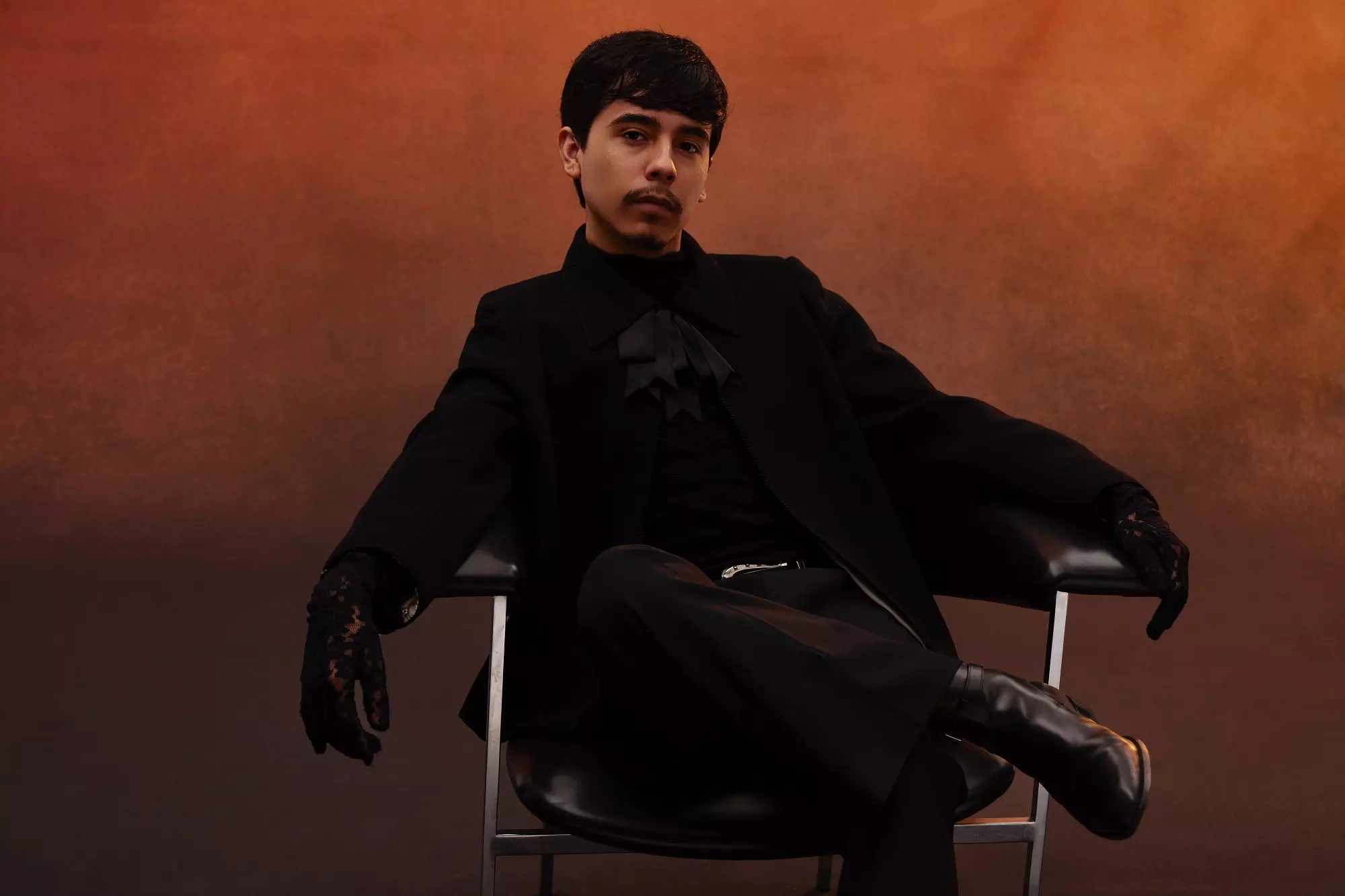
On 'Mirada,' Ivan Cornejo Redefines The Sound Of Sad Sierreño And Helps Fans Heal Through Music
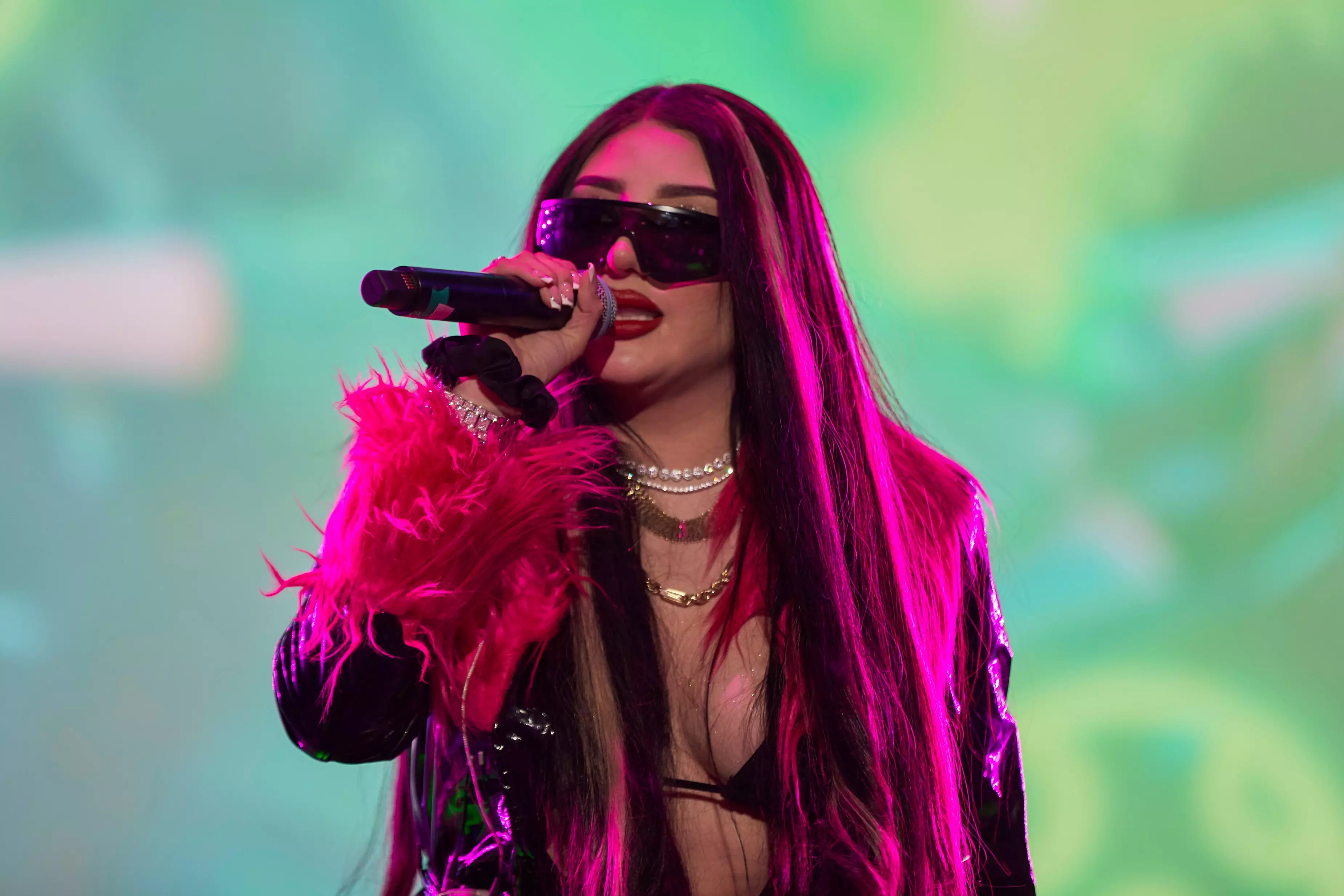
7 Artists Bringing Reggaeton Mexa To The World: El Malilla, Bellakath & More
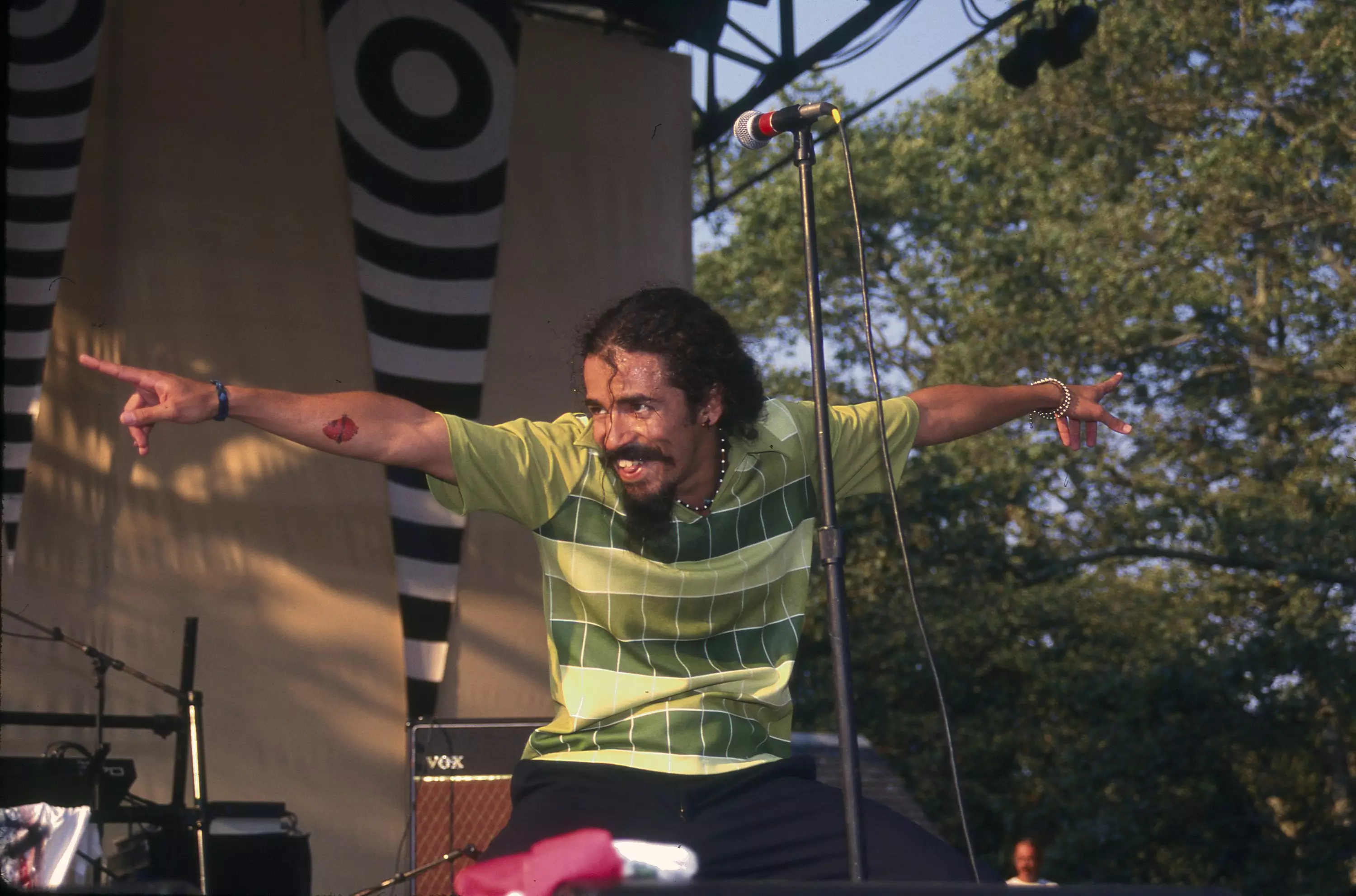
Revisiting 'Re': How Café Tacvba’s 1994 Masterpiece Changed Mexican Music Forever
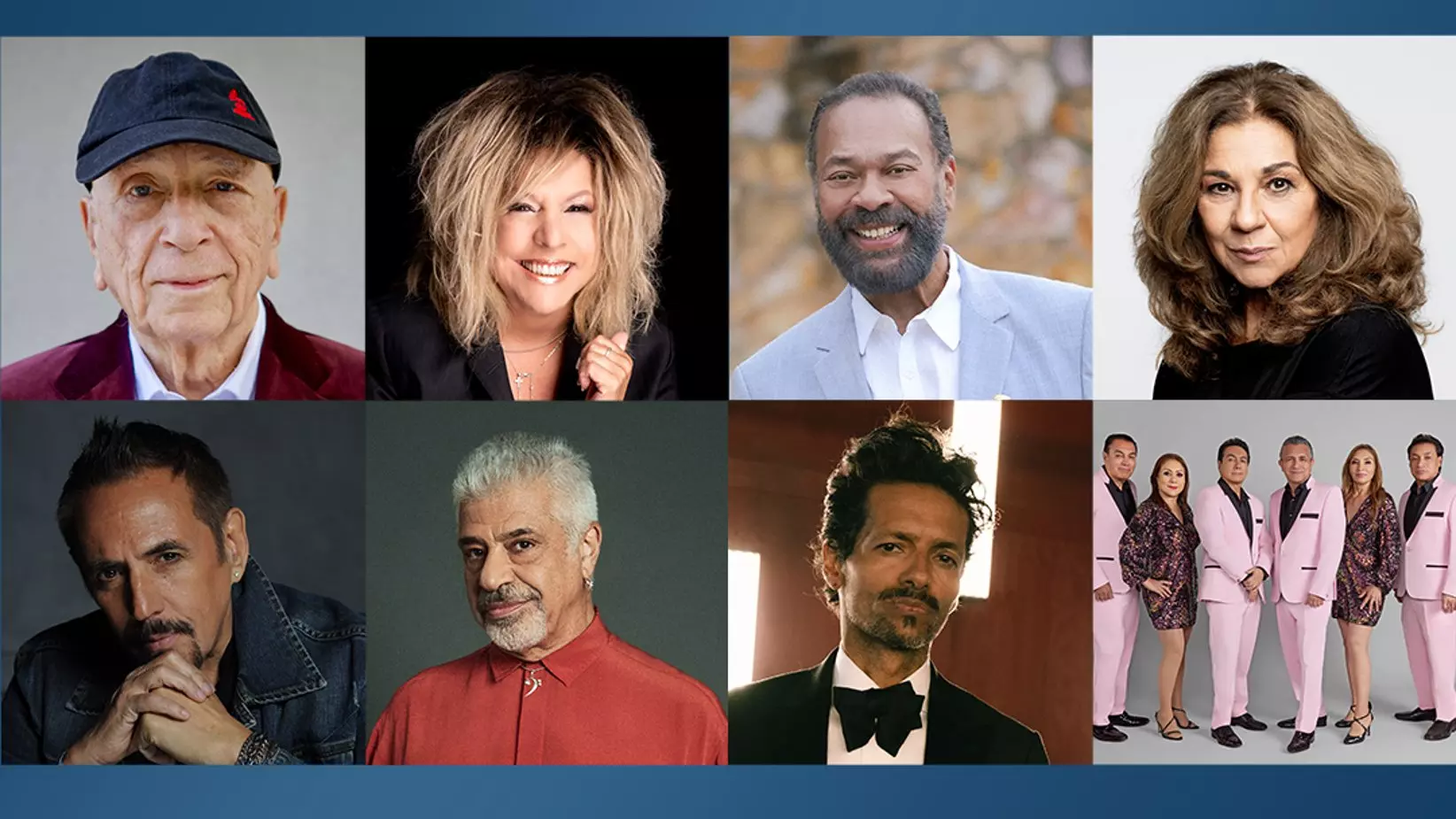
The Latin Recording Academy Announces 2024 Special Awards Recipients: Los Ángeles Azules, Draco Rosa, Albita, Lolita Flores & More

Nelly Furtado On How Remix Culture, ADHD & Gen Z Inspired Her New Album '7'
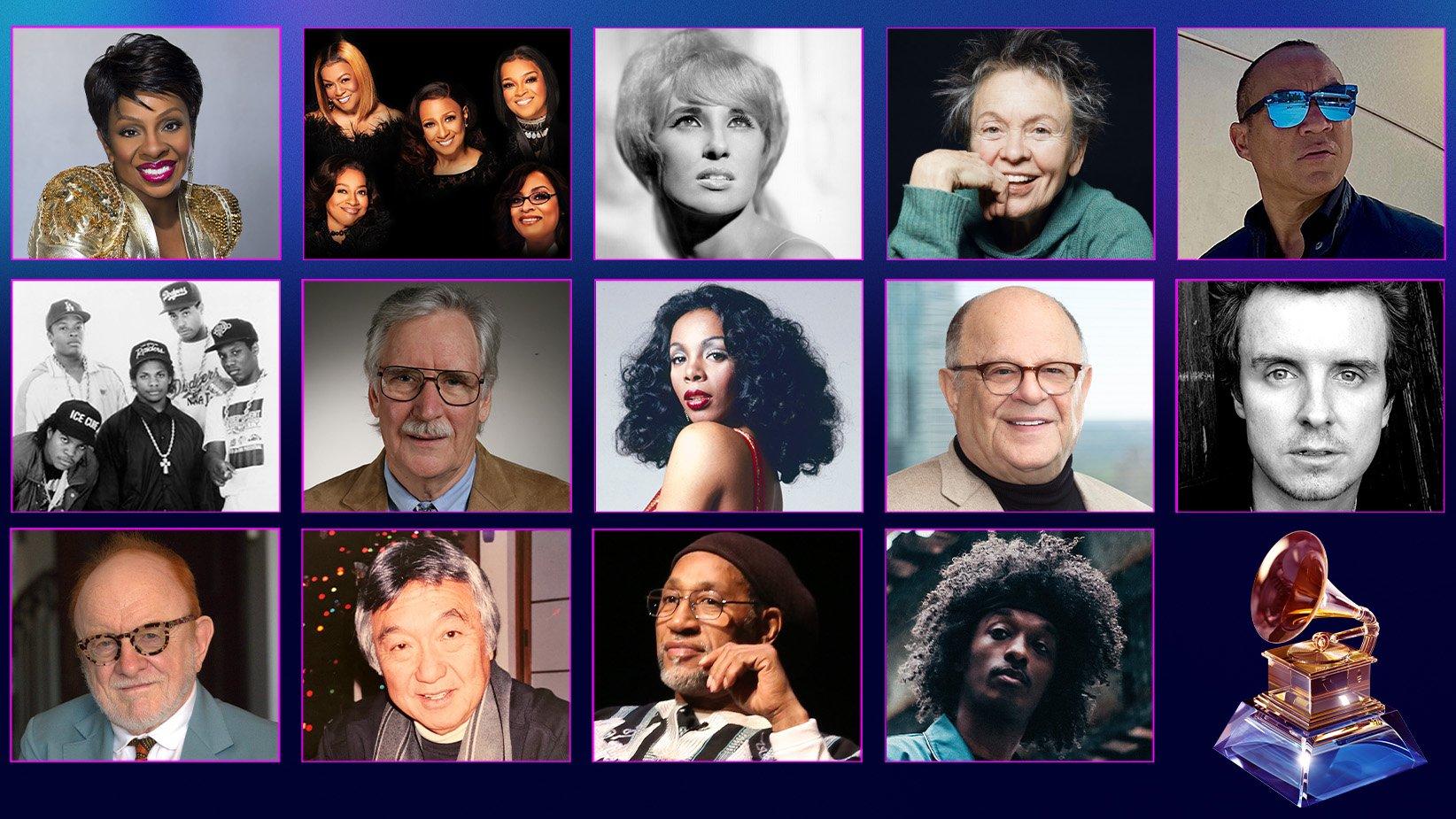
Photo Credits: Derek Blanks; Mel Elder, Jr.; Michael Ochs Archives; Stephanie Diani; Kim Virdi; TiVo; photo courtesy of SMPTE; Copyright Brian Leatart; Gittings; Steve McEwan; Henry Diltz; Kobayashi Family; Johnny Nunez/WireImage; Nabil Elderkin
news
The Recording Academy Announces 2024 Special Merit Award & Lifetime Achievement Award Honorees: N.W.A, Gladys Knight, Donna Summer, DJ Kool Herc & Many More
The 2024 Special Merit Awards honorees include Lifetime Achievement Award recipients Tammy Wynette, the Clark Sisters, and many others. The Special Merit Awards will return to the Wilshire Ebell Theater on Saturday, Feb.3, during GRAMMY Week 2024.
Ahead of the 2024 GRAMMYs, the Recording Academy has announced the 2024 Special Merit Awards honorees.
Laurie Anderson, the Clark Sisters, Gladys Knight, N.W.A, Donna Summer, and Tammy Wynette are the 2024 Recording Academy Lifetime Achievement Award honorees; Peter Asher, DJ Kool Herc and Joel Katz are the Trustees Award recipients; Tom Kobayashi and Tom Scott are the Technical GRAMMY Award honorees; and “Refugee,” written by K’naan, Steve McEwan, and Gerald Eaton (a.k.a. Jarvis Church), is being honored with the Best Song For Social Change Award.
The Recording Academy’s Special Merit Awards Ceremony celebrating the 2023 Special Merit Award recipients will return to the Wilshire Ebell Theatre in Los Angeles on Saturday, Feb. 3.
“The Academy is honored to pay tribute to this year’s Special Merit Award recipients — a remarkable group of creators and industry professionals whose impact resonates with generations worldwide,” said Harvey Mason jr., CEO of the Recording Academy. “Their contributions to music span genres, backgrounds and crafts, reflecting the rich diversity that fuels our creative community. We look forward to honoring these music industry trailblazers next month as part of our week-long celebration leading up to Music’s Biggest Night.”
Lifetime Achievement Award Honorees
This Special Merit Award is presented by vote of the Recording Academy’s National Trustees to performers who, during their lifetimes, have made creative contributions of outstanding artistic significance to the field of recording (through 1972, recipients included non-performers).
Laurie Anderson is a writer, director, composer, visual artist, musician, and vocalist who has created groundbreaking works that span the worlds of art, theater, experimental music, and technology. As a performer and musician, she has collaborated with many people including Brian Eno, Jean-Michel Jarre, William S. Burroughs, Peter Gabriel, Robert Wilson, Christian McBride, and Philip Glass. In 2002, Anderson was appointed the first artist-in-residence of NASA which culminated in her 2004 touring solo performance, The End of the Moon. She has been nominated for six GRAMMY Awards throughout her recording career and received a GRAMMY for the release Landfall in collaboration with the Kronos Quartet at the 61st GRAMMYs.
The Clark Sisters, an American gospel vocal group initially consisting of five sisters: Jacky, Denise, Elbernita, Dorinda, and Karen – have been taking the world by storm since the early 1980s. Credited for helping to bring gospel music to the mainstream, the Clark Sisters are considered pioneers of contemporary gospel. Their biggest crossover hits include: “Is My Living in Vain?,” “Hallelujah,” “He Gave Me Nothing to Lose,” “Endow Me,” their hit song “Jesus Is A Love Song,” “Pure Gold,” “Miracle,” and their largest, mainstream crossover gold-certified, “You Brought The Sunshine.” The Clark Sisters (Jacky, Elbernita, Dorinda, and Karen) have won three GRAMMYs (two awarded to the group, and one to Karen as a songwriter for “Blessed and Highly Favored”), and with 16 albums to their credit and millions in sales, they are the highest-selling female gospel group in history.
Gladys Knight is a seven-time GRAMMY Award winner who has enjoyed No. 1 hits in pop, gospel, R&B, and adult contemporary, and has triumphed in film, television and live performance. Knight has recorded more than 38 albums over the years including four solo albums. She appeared on ABC’s 14th season of “Dancing With The Stars” in 2012, and in 2019, she competed on the inaugural season of “The Masked Singer.” Knight has sung the National Anthem at several major sporting events, including at Super Bowl LIII in Atlanta in 2019, and at the 2021 NBA All-Star Game. She was a National Endowment for the Arts 2021 National Medal of Arts Recipient and received a Kennedy Center Honor for Lifetime Artistic Achievements in 2022.
N.W.A was a rap group from the Compton district in Los Angeles who are credited by many with inventing gangsta rap. The group, consisting of Eazy-E^, Dr. Dre, Ice Cube, DJ Yella, and MC-Ren, developed a new sound, which brought in many of the loud, extreme sonic innovations of Public Enemy while adopting a self-consciously violent and dangerous lyrical stance. In 1988, N.W.A released their album, Straight Outta Compton, a brutally intense record that became an underground hit without any support from radio or MTV. This negative attention worked in their favor as it brought the album to multiplatinum status. Although the group was short-lived, gangsta rap established itself as the most popular form of hip-hop during the mid-1990s.
Donna Summer^ rocketed to international superstardom with her groundbreaking merger of R&B, soul, pop, funk, rock, disco, and avant-garde electronica, catapulting underground dance music out of the clubs of Europe and bringing it to the world. Summer holds the record with three consecutive double albums to hit No. 1 on the Billboard charts (the only solo artist to ever accomplish this), and first female artist to have four No. 1 singles in a 12-month period on Billboard’s Hot 100 chart. A five-time GRAMMY winner and 18-time GRAMMY nominee, Summer was the first artist to win the GRAMMY for Best Rock Vocal Performance, Female (1979, “Hot Stuff”) as well as the first-ever recipient of the new GRAMMY Category for Best Dance Recording (1997, “Carry On”). Summer was the first female artist to win GRAMMY Awards in four different genres: dance, gospel, rock, and R&B.
Tammy Wynette^ first hit the musical scene in 1966 with “Apartment #9” after moving to Nashville and teaming up with record producer Billy Sherrill. Together, the duo wrote songs that reflected the yearnings and the things Wynette felt were important in her life. In 1968, Wynette released “Stand By Your Man,” which sold more than five million singles and became the largest-selling single ever recorded by a female artist. By 1970, she racked up five No. 1 country hits, was named the Country Music Association’s Female Vocalist of the Year three times, and won two GRAMMYs. Wynette was the first female country music singer to sell over one million albums and has sold more than 30 million records grossing more than $100 million, earning her the title “The First Lady of Country Music.”
Read More: GRAMMY Lifetime Achievement Awards | The Complete List
Trustees Award Honorees
This Special Merit Award is presented by vote of the Recording Academy’s National Trustees to individuals who, during their careers in music, have made significant contributions, other than performance, to the field of recording (through 1983, recipients included performers).
Peter Asher’s career began in 1964 as one-half of Peter & Gordon, whose “A World Without Love” topped the charts worldwide. Nine more Top 20 hits followed before Asher became head of A&R for the Beatles’ Apple Records in 1968, and discovered, produced and managed James Taylor; later adding Linda Ronstadt, Neil Diamond, 10,000 Maniacs, Cher, Diana Ross, Kenny Loggins, Bonnie Raitt, Robin Williams, Stevie Nicks, Lyle Lovett, Morrissey, Steve Martin & Edie Brickell, Ed Sheeran, and more to his roster. Asher won the GRAMMY for Producer Of The Year in both 1977 and 1989. He hosts a hit radio show “From Me To You” on Sirius XM and is much in demand not only in the studio but as a performer, speaker and author.
The legendary Rock & Roll Hall of Fame inductee DJ Kool Herc is consistently credited as the founder of hip-hop. His mastery at the turntables is known worldwide, as are his positive contributions to the evolution of hip-hop culture. Herc’s popularity rose by playing long sets of assorted rhythm breaks strung together. Unlike any of his DJ counterparts, Herc is not a rapid rapper who keeps your head spinning with a patter, but he is a musical innovator to the turntables. He first introduced using two turntables to make the beats last longer, creating the illusion of one long break for the B-Boys to show off their skills. Herc has received a great deal of recognition during his lifetime, including his induction into the 2023 Rock & Roll Hall of Fame, and recognition from the New York Landmarks Conservancy as a 2023 Living Landmark.
Joel Katz has played a profound role in shaping the entertainment industry through his work in facilitating entertainment-related corporate acquisitions and mergers and consulting multi-national and multi-media entertainment companies. Katz was ranked Billboard magazine’s No. 1 entertainment attorney in its “Power 100” list of most powerful executives in the music business and has been called “the dealmaker who thinks outside the box.” At Kennesaw State University, Katz endowed and began a commercial music program – one of the largest music education programs in America with over 500 students. He has authored and co-authored many articles and commentary on topics concerning entertainment law. In honor of his work, the University of Tennessee College of Law dedicated its library in his name, the Joel A. Katz Law Library.
Read More: GRAMMY Trustees Awards | The Complete List
Technical GRAMMY Award Honorees
This Special Merit Award is presented by vote of the Producers & Engineers Wing Advisory Council and Chapter Committees and ratification by the Recording Academy's National Trustees to individuals and/or companies/organizations/institutions who have made contributions of outstanding technical significance to the recording field.
Tom Kobayashi^ and Tom Scott met at Lucasfilm’s Skywalker Sound in 1985, when the duo joined the company and completed the building of the Skywalker post-production facilities in both Northern and Southern California. Together, Kobayashi and Scott launched the Entertainment Digital Network, also known as “EDnet,” which employed fiber-optic networks to send high-quality video and audio great distances. Its then-revolutionary technology enabled the industry to link together talent, executives and production facilities at great cost savings. For 25 years, that company connected hundreds of recording studios worldwide in the days before the Internet could handle high-quality audio. EDnet became a part of Onstream Media, and over the decades, tens of thousands of long-distance collaboration sessions were facilitated for the music, advertising, TV, and cinema businesses.
Best Song For Social Change Award Honorees
This Special Merit Award honors songwriter(s) of message-driven music that speaks to the social issues of our time and has demonstrated and inspired positive global impact. The finalists and recipient(s) are selected annually by a Blue-Ribbon Committee composed of a community of peers dedicated to artistic expression, the craft of songwriting and the power of songs to effect social change. See past recipients here.
In June 2023, singer-songwriter K’naan released the inspiring single and accompanying video “Refugee,” co-written by GRAMMY Award-winning songwriter Steve McEwan and GRAMMY-nominated producer Gerald Eaton (also known by his stage name, Jarvis Church). “Refugee” stands out as a distinctive musical endeavor, skillfully interweaving personal and political narratives, and serving as a tribute to refugees around the world. With the single, K’naan drew inspiration from his personal experiences, aiming to redefine the traditional perception of the term “refugee” into a symbol of resilience and strength. The song was written with the hopes of encouraging individuals to embrace the word “refugee” proudly and to give those made homeless by conflict a song that felt like home.
Read More: GRAMMY Technical Awards | The Complete List
^Denotes posthumous honoree.

Photo: Jeff Kravitz/FilmMagic
video
GRAMMY Rewind: Kendrick Lamar Honors Hip-Hop's Greats While Accepting Best Rap Album GRAMMY For 'To Pimp a Butterfly' In 2016
Upon winning the GRAMMY for Best Rap Album for 'To Pimp a Butterfly,' Kendrick Lamar thanked those that helped him get to the stage, and the artists that blazed the trail for him.
Updated Friday Oct. 13, 2023 to include info about Kendrick Lamar's most recent GRAMMY wins, as of the 2023 GRAMMYs.
A GRAMMY veteran these days, Kendrick Lamar has won 17 GRAMMYs and has received 47 GRAMMY nominations overall. A sizable chunk of his trophies came from the 58th annual GRAMMY Awards in 2016, when he walked away with five — including his first-ever win in the Best Rap Album category.
This installment of GRAMMY Rewind turns back the clock to 2016, revisiting Lamar's acceptance speech upon winning Best Rap Album for To Pimp A Butterfly. Though Lamar was alone on stage, he made it clear that he wouldn't be at the top of his game without the help of a broad support system.
"First off, all glory to God, that's for sure," he said, kicking off a speech that went on to thank his parents, who he described as his "those who gave me the responsibility of knowing, of accepting the good with the bad."
Looking for more GRAMMYs news? The 2024 GRAMMY nominations are here!
He also extended his love and gratitude to his fiancée, Whitney Alford, and shouted out his Top Dawg Entertainment labelmates. Lamar specifically praised Top Dawg's CEO, Anthony Tiffith, for finding and developing raw talent that might not otherwise get the chance to pursue their musical dreams.
"We'd never forget that: Taking these kids out of the projects, out of Compton, and putting them right here on this stage, to be the best that they can be," Lamar — a Compton native himself — continued, leading into an impassioned conclusion spotlighting some of the cornerstone rap albums that came before To Pimp a Butterfly.
"Hip-hop. Ice Cube. This is for hip-hop," he said. "This is for Snoop Dogg, Doggystyle. This is for Illmatic, this is for Nas. We will live forever. Believe that."
To Pimp a Butterfly singles "Alright" and "These Walls" earned Lamar three more GRAMMYs that night, the former winning Best Rap Performance and Best Rap Song and the latter taking Best Rap/Sung Collaboration (the song features Bilal, Anna Wise and Thundercat). He also won Best Music Video for the remix of Taylor Swift's "Bad Blood."
Lamar has since won Best Rap Album two more times, taking home the golden gramophone in 2018 for his blockbuster LP DAMN., and in 2023 for his bold fifth album, Mr. Morale & the Big Steppers.
Watch Lamar's full acceptance speech above, and check back at GRAMMY.com every Friday for more GRAMMY Rewind episodes.
10 Essential Facts To Know About GRAMMY-Winning Rapper J. Cole

Photo: Aris Stoulil
interview
'Fast X' Composer Brian Tyler's Career Highlights: Creating a Legacy With The 'Fast' Films, Scoring 'Super Mario Bros,' Befriending Kobe & More
The prolific conductor detailed some of the standout moments of his storied 26-year career, and revealed why the 'Fast X' score is his favorite of the whole franchise.
Even after nearly 30 years in the entertainment business, Brian Tyler is still seeing his childhood dreams come true. He's scored reboots of Rambo, Rescue Rangers, Teenage Mutant Ninja Turtles, Transformers and Power Rangers, and worked with heroes like Steven Spielberg and Danny Elfman.
This year, the award-winning composer added the 2023 reimagining of Super Mario Brothers to his extensive list of dream gigs. Like many kids growing up in the '80s and '90s, Nintendo was a fixture in Tyler's life, so when "Mario" creator Shigeru Miyamoto reached out to him about scoring the reboot, the decision was a no-brainer.
A longtime admirer of legendary composer John Williams, Tyler decided to craft new themes imbued with what he calls "built-in nostalgia" (á la Williams' E.T. score) while paying homage to the trailblazing game. His strategy worked — the bombastic score has earned praise from critics and fans alike.
Six weeks after The Super Mario Bros. Movie was released, Tyler had another big-time score hit theaters: Fast X. He has helped craft and evolve the sound of the blockbuster Fast & Furious franchise since 2006, and while he counts all of his Fast work among his proudest achievements, Fast X is his favorite to date.
Whether he's working on a theme for Rita Repulsa, Luigi or Dom Toretto, one thing can be certain: Tyler is giving it his all. "The only thing that gives me any anxiety about writing music is that I don't wanna let down anybody that created this thing that I love. I want to be associated with it. I want the movie to be great."
In the midst of preparing for his next endeavor — an immersive live concert experience — GRAMMY.com caught up with the composer to chat about some of the most epic moments of his career.
Passing Out Programs To His Musical Heroes At The GRAMMYs
At 12, I was a drummer on The NAMM Show, and I remember talking to a producer, either Elton John's or Metallica's, and telling them, "I want to go to the GRAMMYs. It's my dream." And they were like, "Okay, you're not really hired. But you can come, you can wear a little suit and hand out [the programs]."
So I was there and they put me where the artists come in. I was meeting legends, one after another — Joe Satriani, Metallica, A Tribe Called Quest, Chuck D, Q-Tip. It was crazy. I was so stoked because I was looking up at these artists, like, "Wow, that's the impossible dream."
The funny thing is, Tom Morello from Rage Against the Machine — who I met at either NAMM or the GRAMMYs — now we're friends. Years later, we've reconnected and now, as Madsonik, I've recorded a song with him called "Divebomb."
Playing With Taylor Hawkins
I was in a band with Taylor Hawkins from the Foo Fighters when I was 13, and he was a little older. We were both drummers. I introduced him to hip-hop and Depeche Mode, and he played me Rush for the first time, which changed my life. He was such a fan and, of course, he became friends with them. I met Neil [Peart] and all that. But Taylor was a friend, and we recorded together here at my last studio. We did songs together through the years.
I remember we played in these battle of the bands [competitions], and one of the bands — right before they hit it big — was No Doubt. We were the younger guys, [and] we loved playing super-complicated things. You know, you're like 13 and you want to run before you can walk. We would just shred.
Befriending Kobe Bryant
I met him at a John Williams concert at the Hollywood Bowl. Kobe is my favorite all-time sports figure. I started scoring the same year Kobe joined the Lakers, so we have this thing, right?
I've known John Williams for years and years. He helped me out early on and has always been supportive. And I'm backstage, and then I look over and it's Kobe Bryant! I'm like, "Oh. My. God." And I'm standing there, and he's kinda looking over at me and I go over, and he's like, "You are? Oh yeah, yeah, I know who you are!"
Turns out, he's a huge film score guy. His daughter too. He rehabbed his Achilles to the Ironman 3 score, amongst other things. He loved Hans [Zimmer] and John Williams.
We ended up becoming friends. We would go to lunch and dinners and talk about how he was the heir apparent to Jordan. And how we're standing on the shoulders of giants. He saw John Williams, who is my Michael Jordan. And when he saw me conduct, he noticed that I copy this same really idiosyncratic move that John Williams does when he's conducting. I didn't even realize that I did it! And Kobe is like, "That's just like me. I didn't realize I stuck my tongue out when I would be in iso," which is a Jordan thing.
When he was coming back right after rehabbing his Achilles, Nike wanted to do an ad campaign about how he's weathered the storm and he's coming back. So Kobe's like, "Do you wanna write my theme?" So I did. This is my favorite basketball player, and we became friends, and I didn't wanna let him down.
Composing For "Yellowstone"
With ["Yellowstone" co-creator] Taylor Sheridan, whether we're working on "1883" or "Yellowstone" he sends me the script and I start writing just based on an impression. I don't write to scenes; I usually write themes and suites.
In a sense, the music has a true actual history to it before they even film. As opposed to, I get the film, I look at it, then dive into some random theme in the middle — and it might only be 30 seconds, and you can't develop the whole theme.
What I want is to be almost like a writer — good screenwriters do this — for even a minor character, they'll write a whole background for themselves, and they [share it] with the actors. I want all those themes and everything to almost feel like they exist outside of time and before the story happened. So I'm already making references and kind of variations on a theme at the beginning of the movie. It's not the exact way the theme ends up being developed later in the movie. It's almost like doing it ahead of time, telegraphing what it might become and then it can develop.
I always find it very important to establish those things at the very beginning. The cool thing about Taylor Sheridan, he takes those themes and plays them on set, like through the speakers while they're doing the scenes. And whenever I meet the actors, like Sam Elliott and everyone on the show, they know my music. Even the costume designer and the director of photography.
Our lives are marked by music. You get married, you have your first dance — and the music as you walk down the aisle — and you go to work out or take a run. So it's really cool that Taylor recognized that and will imbue the performances with this kind of musical soul that I was already giving it before they even shot anything.
Reimagining "Super Mario"
When I was growing up, I played "Mario Kart" and "Donkey Kong Arcade." I had my N64. And when I was a little kid, I would get [Electronic] Gaming magazine. I remember I had cutouts of stuff, and I remember articles about Koji Kondo and Shigeru Miyamoto — the guy that invented Mario. And then, here I am, just cruising along working and it's like, "Hey Brian, we want to set up a Zoom call with Shigeru Miyamoto." And I was like, "What?!" We talked about Mario.
I told them I wanted to pay tribute at times to the original themes from the game, but do new things that could flow into the scale of what a movie is, as opposed to a game. I wanted to pay homage, but at the same time, I want to write new themes — like the music John Williams did for E.T. — that feel like what I call "built-in nostalgia," where it's new themes, but you feel like it is Mario already. They loved that idea.
I wrote this 12-minute suite before I started the movie, and played it for them. By the end of it, they're like, "This is also Mario. And we want these themes to be the new Mario themes, along with making a nod to me — a love letter to my experience as a kid playing the game. Like it became real, you know?
There was no ego from Nintendo at all. And the fact that they came to me, way on the other side of the world. Koji Kondo, the guy that wrote all the original Mario themes, he's showing me his DVD collection on Zoom to prove that he's a fan. It was so cool.
Adding To The "Fast & The Furious" Legacy
At the very beginning, the movie's conceit was, "Hey, what's up? I'll race you for pink slips. Sick." So I did more hip-hop. Let's say 80 percent was licensed songs and 20 percent was score. Then all of a sudden Fast and Furious Five comes along, and it starts becoming a little more serious. It's about heists and family, and it's epic.
As each movie kept going, the balance started switching. The score started becoming more prominent. We're always kind of pushing forward the envelope of what you can do with the idea of orchestra with beats, and sound, and groove, and all those things that are sonic ear candy. But at that point — and now it's evolved even more with each movie — the big change is I started writing leitmotifs [themes] for a character.
Before we knew it, the sound of Fast and the Furious was utterly its own. If you look at a chart of how I did the score, it most closely resembles something like a Star Wars or a Lord of the Rings, where you have all of these different themes. It's like an old-school John Williams' score but it sounds modern.
Now we have [Jason] Momoa, the coolest villain ever. And the new theme for him, I'm so happy with it. Typically, with a villain in a movie, people go low dirge-y, just bad-guy music. And here's the thing — Momoa's character, since this is told from his perspective, you have empathy for him, and you understand his origins and sympathize with why he became who he was. So I didn't wanna write, like, a bad guy theme.
It's elegant. It starts in the strings, violins and the harp, but it kind of has this sneaky, sensual vibe that's very attractive. You almost admire the way he cuts you down and talks to you. And he's one of those villains that you have to admit to yourself that you like. So the theme is really elegant and kind of sophisticated, but you know something is f—ed up with this guy, in a beautiful way.
I feel that Fast X is our Empire Strikes Back. It's dark. It's intense. It's really amazing. And you have an introduction of a character that kind of takes over. He can walk in a room and suck all the air out of it, you know? So the theme had to be up to par, and a central idea — which is usually not the case in these types of films that are usually kind of relegated to commercial summer blockbusters.
For me, the bar of difficulty is in a different universe than anything else, because people have associations and judge books by their covers. For me, it's always been the most interesting, challenging, pushing forward. And this is my favorite score of the series.
From 'Encanto' To "Euphoria" And "Grand Theft Auto V": Behind The Making Of A Great Soundtrack
